|
|
|
Sort Order |
|
|
|
Items / Page
|
|
|
|
|
|
|
| Srl | Item |
| 1 |
ID:
154732
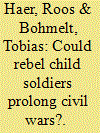

|
|
|
|
|
| Summary/Abstract |
While we know why rebels may recruit children for their cause, our understanding of the consequences of child soldiering by non-state armed groups remains limited. The following research contributes to addressing this by examining how rebels’ child recruitment practice affects the duration of internal armed conflicts. We advance the argument that child soldiering increases the strength of rebel organizations vis-a-vis the government. This, in turn, lowers the capability asymmetry between these non-state actors and the incumbent, allowing the former to sustain dispute. Ultimately, the duration of armed conflicts is likely to be prolonged. We analyse this relationship with quantitative data on child soldier recruitment by rebel groups in the post-1989 period. The results confirm our main hypothesis: disputes are substantially longer when rebels recruit children. This work has important implications for the study of armed conflicts, conflict duration and our understanding of child soldiering.
|
|
|
|
|
|
|
|
|
|
|
|
|
|
|
|
| 2 |
ID:
154730
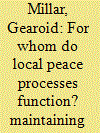

|
|
|
|
|
| Summary/Abstract |
Recent peacebuilding literature provides a sustained critique of externally designed conflict management processes and promotes instead local mechanisms. Such mechanisms, it is argued, will provide more ownership and agency to local actors and, thus, a more sustainable peace. But while there are many examples of local conflict management institutions, and many discussions of the hybrid outcomes of interaction between the global and local, the literature rarely explores exactly what transpires on the ground when international actors influence the operation of local peace processes; this article provides exactly this insight. The data presented illustrate how local conflict management institutions in rural Sierra Leone are subtly manipulated by actors – both international and local – to maintain and enhance existing relations of power. The article illustrates, therefore, the problems that arise when local conflict management institutions become interlaced with new forms of power and start themselves to serve as sites of contestation and resistance.
|
|
|
|
|
|
|
|
|
|
|
|
|
|
|
|
| 3 |
ID:
154731
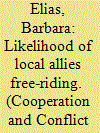

|
|
|
|
|
| Summary/Abstract |
In counterinsurgency interventions, free-riding by small, local allies is persistent. Yet, the literature on free-riding by small allies is largely limited to conventional multilateral partnerships, such as the North Atlantic Treaty Organization, neglecting other types of asymmetric alliances. Using new data containing 144 US requests to local allies in Vietnam, Iraq and Afghanistan, this article tests the logic of economic theories of alliances in counterinsurgency interventions. I find even when small allies are explicitly asked to contribute to alliance-wide security goods, they are likely to free-ride almost half the time (45%), and the likelihood of free-riding is dependent on whether local allies can be excluded by larger allies. This conclusion upholds the logic of economic models, since shared defense goods that exclude local allies fail to meet the criteria of public goods.
|
|
|
|
|
|
|
|
|
|
|
|
|
|
|
|
| 4 |
ID:
154736


|
|
|
|
|
| Summary/Abstract |
This reply to the Symposium on Stefano Guzzini (ed.) The return of geopolitics in Europe?, answers the criticisms by John Agnew, Jeffrey Checkel, Dan Deudney and Jennifer Mitzen. It justifies (1) its specific definition and critique of geopolitics as a theory – and not just a foreign policy strategy; (2) its proposed interpretivist process tracing; (3) the role of mechanisms in constructivist theorizing and foreign policy theory; and (4) its usage of non-Humean causality in the analysis of multiple parallel processes and their interaction. At the same time, it develops the logic of the book’s main mechanism of foreign policy identity crisis reduction.
|
|
|
|
|
|
|
|
|
|
|
|
|
|
|
|
| 5 |
ID:
154734
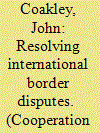

|
|
|
|
|
| Summary/Abstract |
This article explores the value of a specific model of norm replacement in accounting for the circumstances leading to Ireland’s Good Friday agreement (1998), which formally and finally settled the long-running territorial dispute between Ireland and the United Kingdom (UK). Drawing on the theoretical literature, it identifies three phases in this process. First, from the creation of the Irish Free State in 1922 until the civil unrest in Northern Ireland peaked in 1972 the irredentist norm was substantially unchallenged. It was embedded in the 1937 constitution, which defined the national territory as extending over the whole island of Ireland – including Northern Ireland, a part of the UK. The second phase, from about 1972 to 1998, was one of norm competition. The irredentist norm was severely challenged by new political realities in Northern Ireland, and was potentially destabilising for the state itself. It was increasingly challenged by an alternative ‘consent’ norm, one embracing in effect the geopolitical status quo. The third phase, from 1998 onwards, was one of consolidation of the new norm, now written into the Irish constitution to replace the wording of 1937. The article suggests that this model plays a valuable role in accounting for the changing status of the Irish border, but also that the Irish experience has implications for the broad shape of the model.
|
|
|
|
|
|
|
|
|
|
|
|
|
|
|
|
| 6 |
ID:
154735
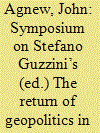

|
|
|
| 7 |
ID:
154733
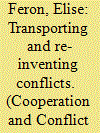

|
|
|
|
|
| Summary/Abstract |
Like other types of diaspora groups, conflict-generated diasporas display a strong attachment to their countries of origin, and structure their identities and ideologies around discourses referring to their homeland. However, their inner cleavages, born out of the conflicts raging in their home countries, can run very deep. The maintenance of their ethnic, religious, linguistic or political divisions even generations after the migration process has taken place sometimes leads to conflict transportation processes, whereby the conflicts raging in their home countries are reproduced and maintained in countries of settlement. Incidents opposing rival diaspora groups are thus often interpreted as a prolongation or reproduction of core conflicts raging in their regions of origin. Against this assumption, this article argues that if transported conflicts often formally take the shape of core conflicts, and emulate them by using the same language, symbols and ethnic/religious/linguistic categories, they are also deeply transformed by the migration process itself. In this perspective, this article explores the transformation and reinvention of conflict-generated diasporas’ politics, and proposes to look at the autonomisation processes they display vis-à-vis the core conflicts, in terms of content but also of objectives, ultimately generating a drift at the political and organisational levels.
|
|
|
|
|
|
|
|
|
|
|
|
|
|
|
|
|
|
|
|
|